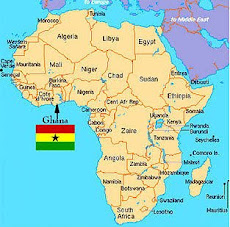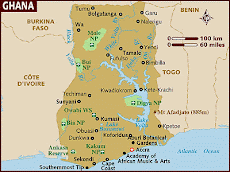In Wa, the percentage of Muslims is much higher, at about 70%. This is due to the influence of, and trade with, Arabs from North Africa. However, there are also churches and schools that are Roman Catholic, Presbyterian, Methodist and evangelical “Church of God”. Religion features in virtually all conversations. For example, on a recent visit to a school with one of the circuit supervisors (advisors), a teacher was admonished for not completing the register correctly, and it was made clear to her that if she didn’t do it properly in future, then she
 will be “harshly judged by God at the gates of heaven”.
will be “harshly judged by God at the gates of heaven”. Virtually every shop, business, bus, taxi and “tro-tro” carries a quote from the Bible or Koran, or makes reference to God. Some examples of these shops are pictured.
 start of the meeting a request was made for a volunteer to say a prayer. One of the Muslims said a prayer and everyone took it very seriously, the Catholics crossing themselves etc. At the end of the meeting, there was a request for another volunteer to say a prayer. This led to a great deal of laughing and good humour, as people joked about equality and the need to make sure that we should end with a Christian prayer, because we had started with a Muslim prayer. This resulted in a prayer from one of the Catholics present and, again, everyone took it very seriously.
start of the meeting a request was made for a volunteer to say a prayer. One of the Muslims said a prayer and everyone took it very seriously, the Catholics crossing themselves etc. At the end of the meeting, there was a request for another volunteer to say a prayer. This led to a great deal of laughing and good humour, as people joked about equality and the need to make sure that we should end with a Christian prayer, because we had started with a Muslim prayer. This resulted in a prayer from one of the Catholics present and, again, everyone took it very seriously.Last weekend, we took a cycle ride to a nearby village, Nakori, with one of our housemates, Cathy. She is a social worker who is working with street children for a Ghanaian charlity called Youth Alive. We were told that the village has a particularly ancient and beautiful mosque. It is only 5 kilometeres from Wa, so we set out very early in the morning to avoid the heat of the day. The cycle ride was a fantastic experience. We only saw one motor vehicle and a motorcycle all day. Everyone else on the road was walking or cycling. The people were carrying water, wood for their fires and a whole variety of different produce for market on their heads. (It’s interesting that animals are not used to transport things in this area.) Everyone was welcoming and friendly and, of course, we went through the traditional greetings with everyone we saw. A white person is still a very unusual sight and many people find us very amusing. The children often shout “nasalla” after us. This means “white person” or “foreigner”, and it is shouted as a friendly greeting.
At Nakori, we were met by the village elders, and the Chief then took us on a personal tour of the mosque. It was built in the 14th century out of mud and sticks and it really is a fascinating building. The sticks were used to enable builders to climb the mosque wall to add higher layers during it’s construction. The mosque is used regularly today, although it is not big enough to hold all the villagers, so many of them now use the larger, modern mosque nearby.

In Nakori, we also visited a tiny factory, where corn was being ground into corn flour. Corn flour is used to make the staple food, “TZ”, which is usually eaten with a vegetable soup, often containing okra. The other main staple food is “fufu”, which is made by pounding yam or plantain. We have not yet been able to develop a taste for either of these, but we will keep trying! The picture below shows one of our local shops in Wa, where the woman is pounding yams to make fufu.
On the work front, things are gathering pace. We have interviewed many district education staff. We have started to meet the heads of the 9 schools we have been allocated, and we are planning a series of meetings to discuss a development plan that would enable the education service to access grants. It is a fact of life in Ghana that education is almost entirely dependent on NGOs for any innovative or development activities. In fact, UK DFID finance is the main funding that enables education service staff to carry out their normal duties. If the funding doesn’t arrive they are unable to visit the schools, carry out training or fulfil their regular duties.
By the way, thanks to everyone who has sent an email in response to our blog. We love getting them!








